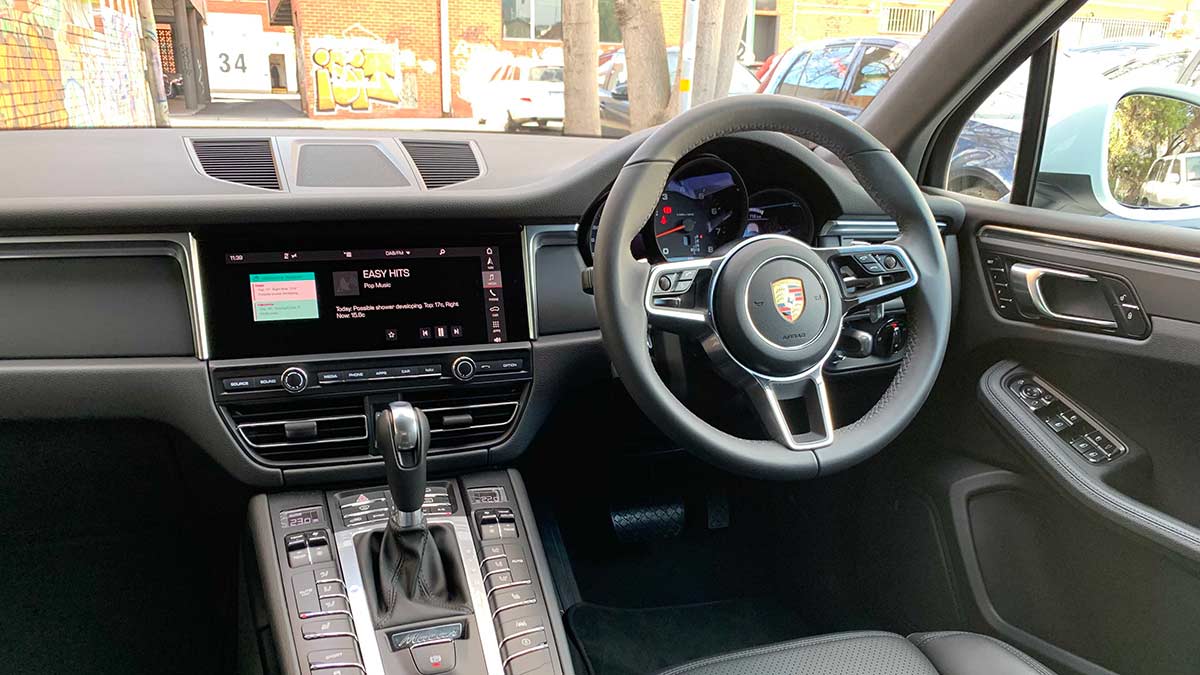The Denza B8 is a powerful new plug-in hybrid luxury 4WD launching in Australia, combining 100km electric range, 3500kg towing capacity and genuine off-road capability. We test its performance, interior technology and whether it can rival established luxury SUVs.
Porsche Macan 2019: Road test review

Greg Hill takes the luxury Porsche Macan SUV for a road test.
Mention the name Porsche and the immediate thought is of a sleek, high-performance, top-end sports car, so when RACV’s vehicle engineering team tested the Porsche Macan recently it drew some interesting reactions.
Sports cars aside, Porsche manufactures a range of luxury SUVs and the Macan, a medium-size SUV, is the brand’s top-selling model. The base version we drove is the entry point into the Porsche range in Australia. It’s powered by a four-cylinder 2.0-litre turbocharged petrol engine, producing 185kW of power and 370Nm of torque. Pricing starts at $81,400 plus on-road costs. This steps up to $97,500 for the sprightlier Macan S with a new 3.0-litre, turbocharged V6 under the bonnet.
Thumbs up
The broad spread of strong mid-range torque delivers responsive performance that is ideal for everyday driving.
Thumbs down
Some highly desirable common features are extra-cost options. Increased fuel consumption and emissions.
There is not a great deal of difference in the comfort and convenience features – the extra money covers mainly mechanical and cosmetic equipment. The S gets a bigger engine, brakes and wheels, as well as an active suspension management system. Both are coupled with a seven-speed dual-clutch-style automatic transmission and employ Porsche’s Traction Management active all-wheel-drive system with a button-operated off-road mode.
In a recent mid-life update, subtle stying changes have smartened up the appearance, and improvements made to the comfort, connectivity, lighting and driving dynamics. An extensive range of options and packs provide plenty of choice to further personalise the look and on-road ability – at a price. The diesel version was discontinued late last year.
The Macan cabin has Porsche’s typical premium look and feel, with leather trim, comfortable front sports seats (14-way electrically adjustable) and a well laid-out cockpit-style presentation dominated by an excellent new 10.9-inch touchscreen which is part of the new Porsche Communication Management system. Standard equipment follows the luxury car theme, but there are a few expected items disappointingly missing. For example, lane-departure warning and eight airbags, including side airbags in the rear, are standard, but the all-important autonomous emergency braking, which can be found on some of the most basic small cars, is only available when you option the $2410 Adaptive Cruise Control with Porsche Active Safe system.
As a practical medium-size SUV, the space is not abundant but the Macan comfortably seats four adults and will accommodate five at a squeeze. Tall adults may also find the rear head and leg room a bit tight. There’s a good-size luggage compartment with the 40/20/40 split-fold rear seat providing extra versatility.

While the 2.0-litre base Macan variant doesn’t quite have the exhilarating performance of its V6-powered S sibling and other sporting-focused Porsche models, it’s still surprisingly sprightly for a four-cylinder medium-size SUV. Peak torque of 370Nm is available from 1600rpm through to 4500rpm, and combined with the responsive seven-speed automatic, provides strong, flexible performance that’s enjoyable and ideal for everyday driving. A sport mode button on the centre console sharpens up the gearshift response for a more enthusiastic drive, but at the expense of some fuel economy.
Strangely, with the update, the official ADR fuel consumption and CO2 emissions have increased. The consumption has jumped from 7.4L/100km to 8.9L/100km and CO2 emissions have climbed from 172g/km to 204g/km. Over combined city and highway use, our test vehicle was thirstier, averaging 11.8L/100km. As with many premium models, the petrol required is premium-grade 98 RON.
The Macan is an engaging drive, with the new model’s chassis, suspension and braking system upgrades adding to the agility and surefooted roadholding. In typical sports-car fashion, different-sized tyres are fitted front and rear and are designed to work in combination with Porsche’s sophisticated intelligent all-wheel-drive system for improved driving dynamics. The steering on our test car had a precise, appropriately weighted feel but it was fitted with the Power Steering Plus option which provides speed-sensitive power assistance to reduce steering effort during manoeuvring and at low speeds. Once again, another $650.
Not only is Macan one of the sportiest drives in the segment, its ride comfort has not been compromised. Body movement is nicely controlled with very little roll for an SUV, even when driven quickly on winding country roads. At the same time, the compliant suspension soaks up most bumps with ease, while the cabin remains quiet and well isolated from general road noise.
The verdict
The Macan is a comfortable-riding premium mid-size SUV that is involving and enjoyable to drive, rather than breathtakingly quick.
|
Price |
Price as tested: $101,040 plus on-road costs. |
|---|---|
|
Drivetrain |
Engine: 2.0-litre turbocharged four-cylinder, seven-speed automatic, AWD |
|
Fuel |
98 RON petrol, 75-litre tank. |
|
Safety |
Not yet tested by ANCAP, eight airbags, front and rear parking sensors, reversing camera, lane-departure warning. |
|
Features |
10.9-inch infotainment system, satellite navigation, 10-speaker 150W sound system, Apple CarPlay/Android Auto, DAB digital radio, auto-dimming rear-view mirrors, LED headlights. |
|
Warranty |
60-month, 100,000-kilometre warranty. 12-month, 12,000-kilometre services. |




